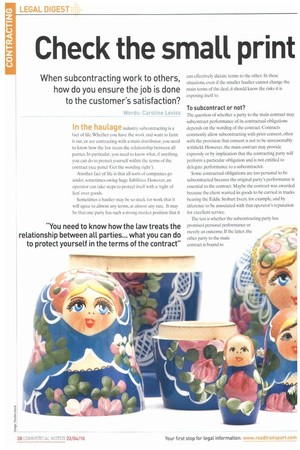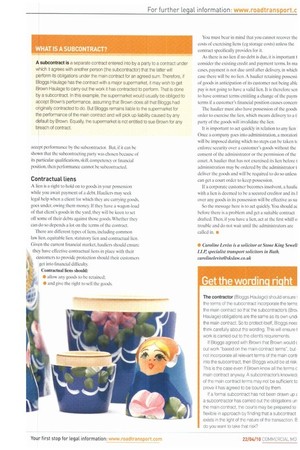Check the small print
Page 28

Page 29

If you've noticed an error in this article please click here to report it so we can fix it.
When subcontracting work to others, how do you ensure the job is done to the customer's satisfaction?
Words: Caroline Leviss In the haulage industry. subcontracting is a fact of life. Whether vou have the work and want to farm it out, or are contracting with a main distributor, you need to know how the law treats the relationship between all parties. In particular. you need to know what. if anything, you can do to protect yourself within the terms of the contract (see panel 'Get the wording right").
Another fact of life is that all sorts of companies go under, sometimes owing huge liabilities. However, an operator can take steps to protect itself with a 'right of lien' over goods.
Sometimes a haulier may be so stuck for work that it will agree to almost any terms, at almost any rate. It MN' he that one party has such a strong market position that it can effectively dictate terms to the other. In these situations, even if the smaller haulier cannot change the main terms of the deal, it should know the risks it is exposing itself to.
To subcontract or not?
The question ot whether a party to the main contract may subcontract performance of its contractual obligations depends on the wording of the contract. Contracts commonly allow subcontracting with prior consent, often with the provision that consent is not to be unreasonably withheld. However, the main contract may provide expressly or by implication that the contracting party will perform a particular obligation and is not entitled to delegate performance to a subcontractor.
Some contractual obligations are too personal to be subcontracted because the original party's performance is essential to the contract. Maybe the contract was awarded because the client wanted its goods to be carried in trucks bearing the Eddie Stobart livery, for example, and by inference to be associated with that operator's reputation for excellent service.
The test is whether the subcontracting party has promised personal performance or merely an outcome. If the latter, the other party to the main contract is bound to accept performance by the subcontractor. But, if it can he shown that the subcontracting party was chosen because of its particular qualifications, skill, competency or financial position. then performance cannot be subcontracted.
Contractual liens
A lien is a right to hold on to goods in your possession while you await payment of a debt. Hauliers may seek legal help when a client for which they are carrying goods, goes under. owing them money. If they have a wagon-load of that client's goods in the yard, they will be keen to set off some of their debts against those goods. Whether they can do so depends a lot on the terms of the contract.
There are different types of liens, including common law lien, equitable lien. statutory lien and contractual lien. Given the current financial market, hauliers should ensure they have effective contractual liens in place with their customers to provide protection should their customers get into financial difficulty.
Contractual liens should:
• allow any goods to be retained: • and give the right to sell the goods. You must bear in mind that you cannot recover the costs of exercising liens (eg storage costs) unless the contract specifically provides for it.
As there is no lien if no debt is due, it is important t consider the existing credit and payment terms. In ma cases, payment is not due until after delivery, in which case there will be no lien. A haulier retaining possessi, of goods in anticipation of its customer not being able pay is not going to have a valid lien. It is therefore seri to have contract terms entitling a change of the paym terms if a customer's financial position causes concert
The haulier must also have possession of the goods order to exercise the lien, which means delivery to a tl party of the goods will invalidate the lien.
It is important to act quickly in relation to any lien Once a company goes into administration, a moratori will be imposed during which no steps can be taken it enforce security over a customer's goods without the consent of the administrator or the permission of the court. A haulier that has not exercised its lien before t administration may be ordered by the administrator t deliver the goods and will be required to do so unless can get a court order to keep possession.
If a corporate customer becomes insolvent, a haulic with a lien is deemed to be a secured creditor and its I over any goods in its possession will be effective as su,
So the message here is to act quickly. You should ac before there is a problem and get a suitable contract drafted.Then. if you have a lien, act at the first whiff o trouble and do not wait until the administrators arc called in. to • Caroline Leviss is a solicitor at Stone King Sewell Lim specialist transport solicitors in Bath. carolineleviss@skslaw.co.uk
































































































































